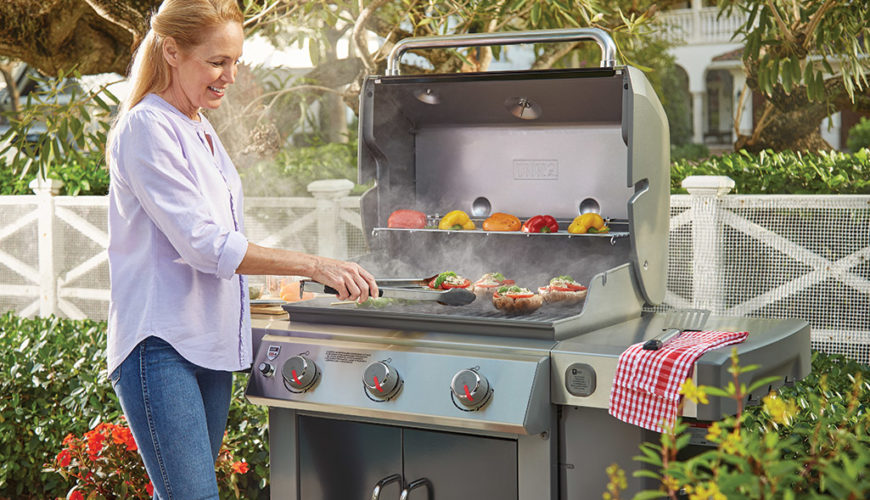When barbecue season starts, many people brag about their grills and share their newest perfected recipes with friends and family. You’ll start finding all sorts of information on what marinade goes well with what meat, how to cook certain dishes on a barbecue and what temperature is perfect for smoking or blackening. All the new information that comes with the start of summer can make you interested in getting your grill or even getting around to replacing your old one. And while you’ve settled for a gas grill, you don’t quite know if propane or a natural gas grill is the best for you.
Natural gas grills are a great option if you’re interested in more environmentally friendly options and saving money while doing it. Today, the overall popularity of natural gas grills has grown more. However, just because they’re eco-friendly doesn’t mean it gets the job done well.
If you’re looking into getting a natural gas grill or another propane grill, stores like Dickson Barbeque Centre have everything you could need for the coming barbecue season.
How do natural gas grills work?
Natural gas grills work quite similarly to a stove. It connects to the same line that your gas stove does and uses that fuel to cook. That same gas is a type of natural hydrocarbon, which usually is formed out of methane, carbon dioxide and helium. These hydrocarbons, when combined, are a considerably better alternative to most other gases.
Much like a gas stove, natural gas grills pipe the gas through to the main heating elements, where an igniter sparks the gas into flames. Though they don’t provide the same smoky flavour charcoal grills do, there are alternatives to smoke meat on natural gas grills. One such way is to use a smoker box.
Benefits of natural gas grills
Natural gas saves you money
When it comes to getting natural gas to fuel for your grill, you might find that it actually costs less than a propane tank. Some tanks can cost roughly four dollars per gallon and these prices can change depending on what province or city you live in. For a single 20-pound propane tank, that cost can become about eighteen dollars. On the other hand, using a natural gas grill can save you anywhere between a third to six times the propane cost.
Natural gas is safer
Due to how natural gas is used for grilling, the overall safety is far more guaranteed. Its composition makes the gas light enough that it floats on top of air, letting it fly away instead of sink. Propane on the other hand is much denser, leading to it sinking instead. This, in turn, increases the potential risk of fire hazards and may even cause an explosion. To make natural gas even safer, installation usually requires a technician or a professional fitter, though they make sure there won’t be any leaks in the future.

The gas comes from your home’s supply
If your city already gives access to natural gas to power your home, a natural gas grill can connect right into your house’s lines. It prevents the need to keep constant track of how much gas you’ve used in the recent months, and you won’t run out of fuel.
Propane tanks can also run out mid-way through a barbecue session, mainly due to the fact you can’t see into the tank. This can end up with you leaving to refill it at a nearby store, and you miss out on any events that happen. Connecting a natural gas grill to your home’s supply makes sure that you have enough for those long cookouts and late-night barbecue parties.
Propane vs Natural Gas
Convenience
Natural gas grills are ideal for several reasons compared to a propane grill. Convenience can greatly come into play when you take into consideration certain factors. For people that find themselves frequently barbecuing with a propane grill, they often have multiple tanks filled with propane ready to replace their current one in the middle of a barbecue session. However, that last tank will be swapped in soon enough, only to be run out midway through. And with no more propane left, you need to refill all the tanks for convenience.
However, if you plan on taking your barbecue with you whenever you go out on trips, the tanks may be a better option. The convenience of not needing to go out and refill an empty tank won’t make an impact unless you can connect your natural gas grill to a line at your destination. Wherever you stop, your propane tank can work well there, given that there aren’t any dents or leaks.
Types of heat
There are also a few other considerations between natural gas and propane grills. Natural gas grills are said to have a drier form of heat as opposed to the “wet heat” propane grills have. The mentioned dry heat is far more preferred for grilling since it allows the meat to be better charred and smoky.
Propane, on the other hand, has the ability to burn at higher temperatures than natural gases. Some say that the higher temperatures can allow the food made to char faster, though the wet heat can also affect the food’s flavour at the end.
Takeaway
Alternatives to propane barbecues include natural gas grills. The hydrocarbon fuel makes gas a far more environmentally friendly option while also allowing you to save money over time. Additionally, natural gas grills don’t face the same need to refill tanks as a propane grill does; instead simply connecting to the same lines your house does to start up. Though it may burn at lower temperatures when compared to propane, the drier heat of natural gas allows a much better char that most barbecue enthusiasts strive to get. Overall, both propane and natural gas are great options, though natural gas grills can come out on top thanks to their eco-friendly alternatives.




